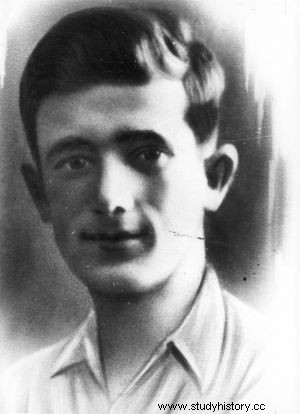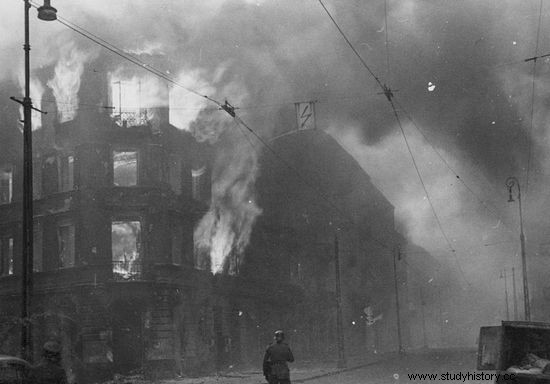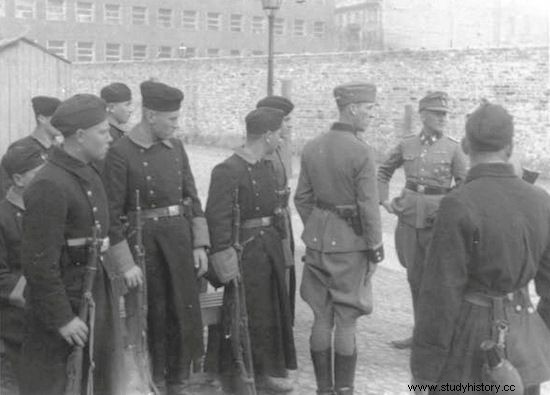Marek Edelman has repeatedly emphasized that the goal of the Warsaw Ghetto Uprising was death with dignity in hand. However, at the time the clashes began, only a small percentage of the fighters had firearms. Why was there so little of it? The answer is simple. The command of the Home Army simply did not believe in handing over any weapons to the Jews.
After the creation of the Jewish Combat Organization in July 1942, its main goal was to provide the best possible rearmament of the Jewish resistance movement. Initially, it was hoped that it would be possible to buy weapons on the black market. Money was not a problem. After all, many rich Jews still lived in the ghetto, who would have financed the entire operation voluntarily or under duress. It soon turned out, however, that it was a deadly endeavor.
We need weapons. Will you help?

ŻOB commander Mordechaj Anielewicz (photo from the book "Izaak's Army").
As rightly noted in his new book, The Army of Isaac. The Struggle and Resistance of Polish Jews ”Matthew Brzeziński, at the marketplace near the Central Station, where weapons were traded, there were plenty of swindlers and Gestapo informants. As a result, ŻOB could only buy one or two pistols at a time, because at that time a larger order would raise suspicions.
In this situation, the Żobowce could do nothing but count on the support of the Polish independence underground.
The first step in this regard was the recognition by the Home Army of the Jewish Combat Organization on November 11, 1942. As soon as this happened, negotiations on the supply of weapons to the ghetto began. From the very beginning, however, they went smoothly. At one point, it even seemed as if the request would be ignored altogether.
It was only under pressure from the Commander-in-Chief, Gen. Sikorski himself, that the Commander of the Home Army, Gen. Grot-Rowecki, decided to transfer a small batch of weapons behind the walls of the Jewish district. Earlier, however - according to what Matthew Brzeziński writes in his book:
In return for any assistance, he demanded a written assurance that the Jews would fight the Soviet Union if there was a need for an armed rebellion against the Red Army.

ŻOB fighters went to fight the Germans with only one goal in mind:to die with a gun in hand. The command of the Home Army did not intend to make it easier for them and did not agree to transfer larger batches of weapons behind the ghetto walls. In the photo, Germans observe burning buildings during the ghetto uprising.
The ŻOB commander, Mordechaj Anielewicz, in turn, did not want to agree. Ultimately, in a letter sent to Rowecki, he assured us that the decisions of the Polish government were binding on us. Such a declaration did not convince "Grot", and even deepened its doubts. This was clearly evidenced by a report sent to London in December 1942, in which he wrote:
Belatedly Jews from various groups, including communists, come to us for weapons […] . As a test, I gave up some pistols, I'm not sure if they will use it at all .
Disappointed hopes
There were a total of "ten" guns, four of which turned out to be completely unusable. For Anielewicz and other Jewish leaders in the ghetto, handing over such a small shipment was a painful blow. This was not what they expected after months of negotiations.
Icchak Cukierman, who headed the Zionists, considered it not so much a lack of trust as simply a manifestation of anti-Semitism . Years later he wrote in his memoirs: It was easier for them to say:"I don't believe you, you don't defend yourself" than "I hate you".
The situation changed slightly after January 18, 1943. It was on this day that the Jews from the Warsaw ghetto took up arms for the first time and directed them against their oppressors. Several Germans who took part in the next displacement action were killed by the bullets of the ŻOB fighters. As a result, the leaders of the Polish Underground State decided that the supplies of weapons to Jews planning to start an uprising should be resumed.
Not all Home Army soldiers, however, wanted to accept this decision. For example, Lt. Bolesław Nanowski "Zadora", from the capital's Home Army counterintelligence, on February 11, 1943, clearly stated that:
You cannot count on such resistance from Jews that it would be worth giving them weapons. The losses of the Germans will not compensate for the value of the weapons, and the resistance of the Jews will not even deserve the honorable mention of the honor of Polish Jews.
His voice was by no means alone. Therefore, until April 19, the Home Army provided the ŻOB with only one manual machine gun, one submachine gun, 50 pistols and revolvers, and several dozen grenades.

The attitude of the Home Army command towards the ŻOB fighters changed slightly only after they started shooting at the Germans. In the photo, General Jürgen Stroop and soldiers of auxiliary units at Umschlagplatz during the ghetto uprising.
A number of explosives and kerosene were also thrown behind the wall. In addition, a member of the Bund, engineer Michał Klepfisz, was trained in the construction of bombs and grenades. All of this was a fraction of what the Żobowcy were hoping for. And it only slightly supported the uprising.
It should be noted that the reason for such modest deliveries was not so much the small stocks of weapons that the Home Army had at that time, but still mainly the attitude of General Grot-Rowecki. For he was still skeptical about the political sympathies and loyalty of the Jewish Combat Organization . As a result, on the day of the outbreak of the ghetto uprising, only one in ten of the fighters had a chance - as Marek Edelman put it - a dignified death with a gun in his hand.
